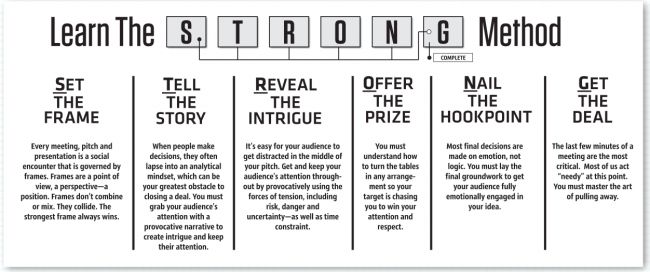
Do you think you are selling a product or a service? You’re not.
You are fighting a battle of persuasion. Is the pitch about why should they buy from you or how they can gain access to your product? It is all a question of framing. Framing and human psychology are topics at hand in Oren Klaff’s Pitch Anything.
The Key To A Perfect Pitch
When the aim is to persuade how can your seize control of the situation and ensure the target hears your pitch through the frame of mind you desire them too? Well, according to Klaff, it starts with neuropsychology. The human brain evolved in three different stages. The first, our croc brain, is the most primitive and fast reacting focusing on survival and generating strong emotions. The middle brain is next, helping us read more complex interactions like social settings. The third, the Neocortex, is the most sophisticated and facilitates the reasoning and analysis process helping us understand complex ideas.  In a pitch all three play roles but as the croc brain will be the first to react your must place your focus on grasping its attention first. To do this neurological research encourages evoking two sensations: desire and tension. These emotions result in the release of dopamine and norepinephrine thus increasing the likelihood of your audience following what you have to say. In addition to piquing attention it is crucial that you maintain the frame control of the room. This is essentially the power dynamic of the room and may be unbalanced in the following ways: time frame, power frame, analyst frame,and intrigue frame. To maintain control of the room it is important to recognize when one of these elements is in question and how to turn the tide back in your favor. For example if a customer where assert control of the time frame by saying, “I only have ten minutes,” you could respond with, “that’s ok, I only have 5.”
In a pitch all three play roles but as the croc brain will be the first to react your must place your focus on grasping its attention first. To do this neurological research encourages evoking two sensations: desire and tension. These emotions result in the release of dopamine and norepinephrine thus increasing the likelihood of your audience following what you have to say. In addition to piquing attention it is crucial that you maintain the frame control of the room. This is essentially the power dynamic of the room and may be unbalanced in the following ways: time frame, power frame, analyst frame,and intrigue frame. To maintain control of the room it is important to recognize when one of these elements is in question and how to turn the tide back in your favor. For example if a customer where assert control of the time frame by saying, “I only have ten minutes,” you could respond with, “that’s ok, I only have 5.”  As the meeting comes to a close it is important to remember that, contrary to popular belief, we don’t actually make most decisions based on rational analysis. Instead most choices are based on a gut feeling, or hot cognition, that we later attribute a line of reasoning to after the fact. To make the most of this process you need to cater your pitch to trigger hot cognitions through stacking frame, or introducing multiple frame in quick succession. So for example you could start with a compelling story (Intrigue frame) stopping to leave them in suspense and then turning the tables to ask something like, "This deal has so many investors I need to see who I can take onboard." (prize frame) Then end the pitch with something like, "Unfortunately this is a limited time offer and we will no longer be accepting new clients starting Monday." (time frame) Practice these processes and next time you find yourself in a position to persuade you will be ready to turn the tide in your favor.
As the meeting comes to a close it is important to remember that, contrary to popular belief, we don’t actually make most decisions based on rational analysis. Instead most choices are based on a gut feeling, or hot cognition, that we later attribute a line of reasoning to after the fact. To make the most of this process you need to cater your pitch to trigger hot cognitions through stacking frame, or introducing multiple frame in quick succession. So for example you could start with a compelling story (Intrigue frame) stopping to leave them in suspense and then turning the tables to ask something like, "This deal has so many investors I need to see who I can take onboard." (prize frame) Then end the pitch with something like, "Unfortunately this is a limited time offer and we will no longer be accepting new clients starting Monday." (time frame) Practice these processes and next time you find yourself in a position to persuade you will be ready to turn the tide in your favor.









